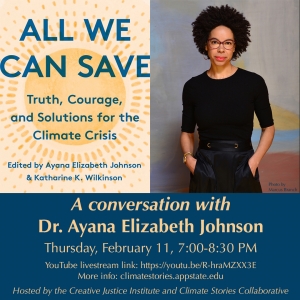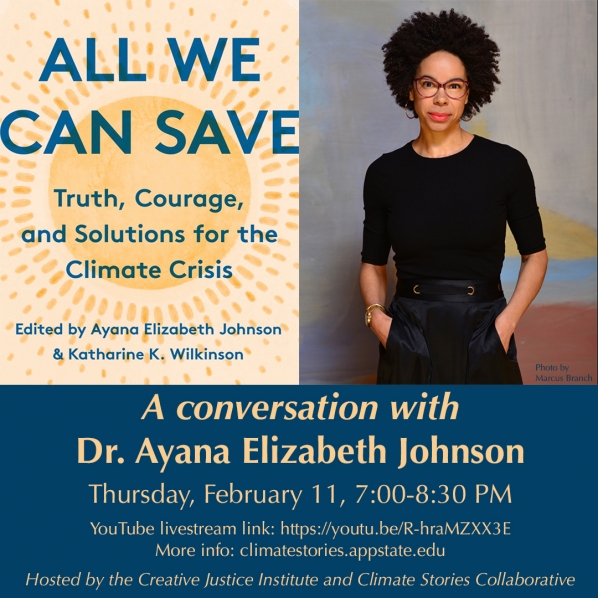Thursday, February 11
7:00-8:30 p.m.
YouTube livestream: https://youtu.be/R-hraMZXX3E
More info at: https://climatestories.appstate.edu
The Creative Justice Institute and Climate Stories Collaborative are bringing an inspiring climate leader to our campus this spring—Dr. Ayana Elizabeth Johnson.
Johnson is a leading voice in the climate conversation and co-editor of the new anthology "All We Can Save: Truth, Courage, and Solutions for the Climate Crisis," a powerful collection of writings by women spanning backgrounds, approaches and generations at the forefront of the climate movement.
The climate crisis is an enormous tangle of problems, born of and amplifying injustices, including racial injustices. The daily news on these problems can cause feelings of overwhelm, so we must counter that by stoking our inspiration to participate in the transformations necessary for a just and livable future. Feed your inspiration for action by joining us for a virtual conversation with Dr. Ayana Elizabeth Johnson, marine biologist, policy expert and leader/cultivator of the climate movement.
This event is hosted by Cara Hagan, Laura England and students.
Thank you to the following co-sponsors for making this event possible:
- College of Fine & Applied Arts
- College of Business
- College of Arts & Sciences
- Reich College of Education
- Office of Sustainability
- Department of Sustainable Development
- Department of Biology
- Department of Communication
- Department of Interdisciplinary Studies
- Schaefer Center for the Performing Arts
About Dr. Ayana Elizabeth Johnson
Dr. Ayana Elizabeth Johnson is a marine biologist, policy expert, writer and Brooklyn native. She is founder of Urban Ocean Lab, a think tank for coastal cities, and founder and CEO of OceanCollectiv, a consulting firm for conservation solutions. She recently co-created the Blue New Deal, a roadmap for including the ocean in climate policy. She is co-creator and co-host of the podcast How to Save a Planet, co-editor of the anthology "All We Can Save," co-founder of The All We Can Save Project and she has written and presented widely on hope, strategy and the intersections of race, racism and the climate crisis.
Johnson earned a B.A. from Harvard University in Environmental Science and Public Policy, and a Ph.D. from Scripps Institution of Oceanography in marine biology, with a dissertation on the ecology, socio-economics and policy of sustainably managing coral reefs. For her research, she was awarded fellowships from the National Science Foundation, Switzer Foundation and American Association of University Women. She has been named to the Grist 50, UCSD 40 Under 40 Alumni, and Elle’s 27 Women Leading on Climate. Outside Magazine called her “the most influential marine biologist of our time.” As co-director of partnerships for the March for Science, Johnson created a coalition of over 300 organizations that inspired over 1 million people around the world to take to the streets to support the role of science in policy making.
She is the proud daughter of a teacher/farmer and an architect/potter. Her work has been featured in The New York Times, The Atlantic, Outside Magazine and Nature magazine. Her op-eds have been published in The New York Times, Washington Post, Los Angeles Times, The Guardian and Huffington Post, and she blogs on Scientific American. She is a passionate advocate for coastal communities, and builds solutions for ocean justice and our climate crisis.
The Creative Justice Institute (CJI) encourages faculty, staff and students to collaborate and reimagine our culture, work toward a more just and inclusive future using our innovation and creative energy. The CJI was founded in 2020 by Cara Hagan, the College of Fine and Applied Arts Dean’s Fellow for Diversity and Inclusion and Associate Professor of Dance Studies. The CJI incorporates the possibilities that the arts, humanities and design offer our community in working toward real, systemic change.
About The Climate Stories Collaborative
The Climate Stories Collaborative (CSC) is a transdisciplinary learning community aimed at growing the capacity of faculty and students to use a variety of creative media to tell compelling climate stories, including the stories of those who are affected by, and/or taking action to address, climate change. The project began in the spring of 2017 in the College of Fine & Applied Arts, but is now university-wide in scope. Collaborative co-facilitators include Laura England (Sustainable Development), Derek Davidson (Theatre & Dance), and Jennie Carlisle (Art).

